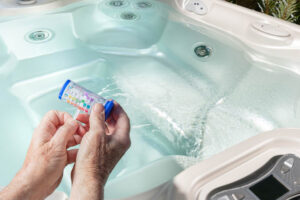Hot Tubs Have Chlorine
The answer to the question, “Do hot tubs have chlorine” depends on a number of factors. This includes the size of the hot tub, how often it is used, and the age of the water. Larger hot tubs, for example, require higher amounts of chlorine and chemicals than smaller ones.
To protect the user from germs, hot tubs near me are treated with chlorine. This chemical kills the majority of bacteria and viruses in water. However, chlorine does not completely sterilize water. Some germs survive normal levels of chlorine for several hours. Also, the water temperature of a hot tub makes it more difficult for the chlorine to stay in the water. Therefore, it is essential to test your hot tub water on a regular basis.

When using a chlorine-based solution, you must first measure the amount of water in your hot tub. Then, use the amount of granules according to the instructions on the packaging. You will need about one-half ounce per 200 gallons of water. If the water is larger, use two-thirds to one-half ounce of granules.
Do Hot Tubs Have Chlorine?
High levels of sanitizers can affect the pH of the water, cause skin irritation, and create a chemical smell around the spa. These chemicals can also cause copper to build up in the water. It is best to keep the levels of chlorine and bromine between one and three parts per million. Once the pH of the water falls below this range, it is safe to use the water. You should follow the directions on the container to avoid a chemical reaction.
While chlorine is considered the most effective disinfectant for hot tubs, bromine is a less effective option. This chemical can be more difficult to remove from the skin and can aggravate respiratory conditions. In addition, the bromine odor lasts longer than that of chlorine. Because of these differences, you should keep a cover over your hot tub, especially if it’s outdoors.
When choosing between salt water and chlorine, it’s important to look at the safety and cost of each option. Chlorine-based systems last longer than their salt-water counterparts, and they’re also cheaper. Salt water systems also require more maintenance. Salt-based systems also tend to create bacteria and viruses, making them more prone to corrosion.
When choosing a chlorine product for a hot tub, it’s best to choose the one with the highest free chlorine concentration. The CDC recommends a pH of 7.2 to 7.8. They also recommend a chlorine concentration of 2 ppm or higher. However, cyanuric acid is not recommended for use in hot tubs, as it tends to raise the pH.
If you decide to use a salt water system, you will be using chlorine produced naturally in the water. This means that you’re reducing your chemical usage and reducing waste. Salt water systems also have some health benefits, such as helping those with arthritis cope with pain and stiffness. As such, the Arthritis Foundation recommends warm water therapy as an excellent way to cope with arthritis. The benefits of this therapy have been confirmed by research.
